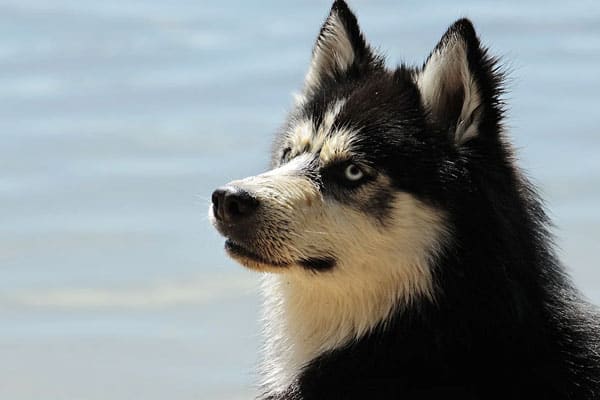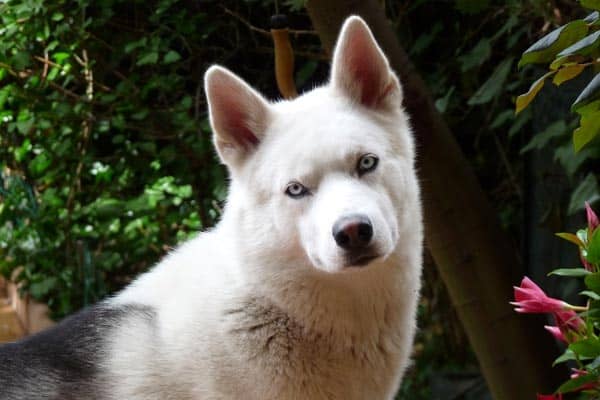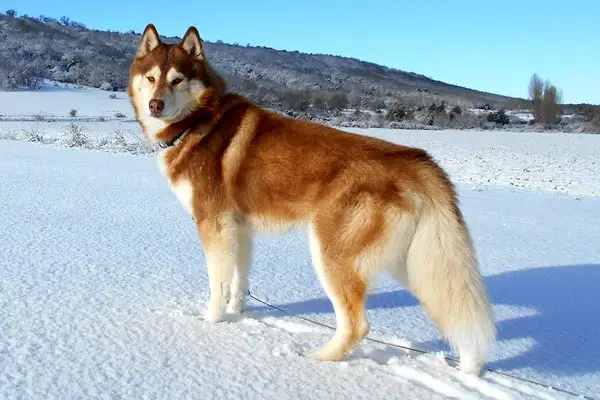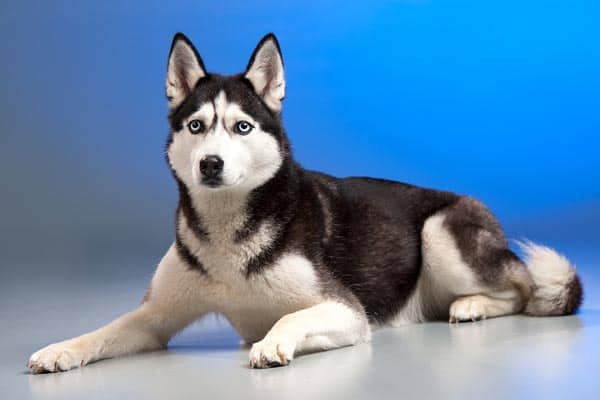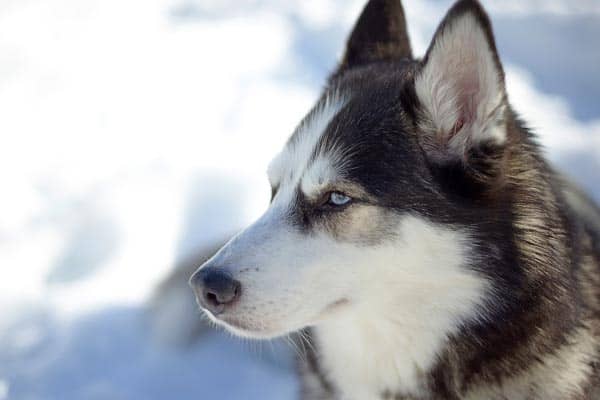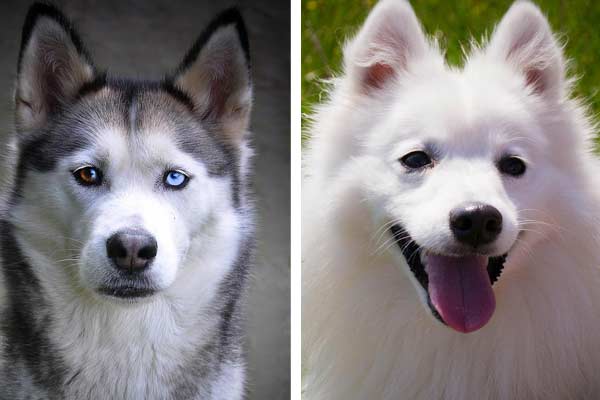Are Huskies Good Service Dogs: Why Huskies Are Not a Popular Service Dog Breed Choice
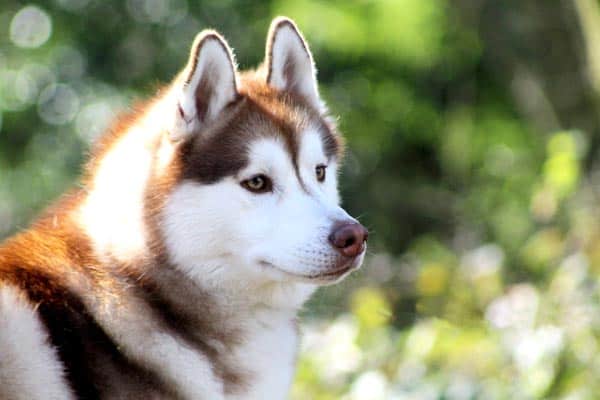
Huskies are working dogs. These dogs have been bred and trained for centuries to serve and work alongside humans in some very specific roles.
However, the work that Huskies have traditionally done does not include formal service dog work. This is not to say that Huskies cannot make good service dogs, but they are not a first-choice dog breed for this role.
In this article, find out whether or not Huskies are good service dogs when they get the opportunity. Also, learn what you need to know before choosing a Husky as your service dog breed.
Are Huskies Good Service Dogs?
Huskies are not a popular dog breed choice to be service dogs overall. Some people also say that Huskies cannot ever be good service dogs, while other people strongly disagree with this statement. However, some Siberian Huskies and Husky mix dogs do make great service dogs. It really depends more on the dog-owner team and on the individual dog’s disposition than on the breed.
Meet a Husky Service Dog on Video
This informative YouTube video shares the main reasons why Huskies are not typically chosen to do service dog work.
However, as the video also showcases, this may be an oversight. Clearly, Dakota, the Husky, is doing a great job as a service dog to her human.
Can Huskies Ever Make Good Service Dogs?
When someone uses the term “Husky,” they usually are referring to the purebred Siberian Husky dog breed.
However, other related breeds include the Alaskan Husky (more of a breed category than a specific dog breed), the Alaskan Malamute, the Samoyed, the American Eskimo Dog, the Finnish Lapphund, the Keeshond, the Shiba Inu, and the Swedish Vallhund, among others.
You will notice that none of these dog breeds makes the list of the most popular service dog breeds, which are the Labrador Retriever, Standard Poodle, the Golden Retriever, and several others, according to VCA Animal Hospital.
This is not because Siberian Huskies or their Husky relatives absolutely cannot be good service dogs.
Rather, it is because there are many other dog breeds that adapt more readily to the training and discipline required to be a service dog to a human in need.
As you will learn in this article, in some cases the Husky may actually have the perfect mix of traits to be an individual person’s service dog breed of choice.
But in the majority of cases, a Husky will present more of a challenge to train and handle in a service dog role than many other dog breeds.
What Is the Difference Between a Working Dog and a Service Dog?
As we mentioned in the introduction here, the Husky dog breed is considered a true working dog breed.
On this basis, many people assume that the Husky will be a natural choice because service dogs are working dogs.
But it is the type of work being done that makes the major difference.
As the American Kennel Club (AKC) relates, Siberian Huskies are bred from a long line of Arctic (cold weather) working dogs called spitz dogs.
Spitz dogs have some unique features that help these dogs do their best work under some extremely difficult weather and terrain conditions.
While these traits are excellent for a dog that may need to pull a heavy sled in a dog team for hundreds of miles across the icy ground or hunt for prey under layers of ice, the same traits can be challenging if you are trying to train a service dog.
After all, you don’t want your service dog to take off every time they see a squirrel or cyclist pass by. You don’t want your service dog to need hours and hours of exercise when you need your dog to be attentive to your needs.
And you don’t want your service dog to decide to be stubborn just when you need your dog to do exactly what you tell them to do.
Service dog work is work, yes, but it is a type of work that is quite different from the Husky’s traditional work pulling sleds, scouting prey, and helping hunt and working closely within a pack of other dogs.
Traits That Make Huskies Less Than Ideal for Service Dog Work
How might the traits that Huskies as a breed are known to make these dogs a less than perfect fit as a service dog? Let’s find out.
Huskies go through year-round and seasonal coat shedding
The Husky coat is a thick, double-layer coat that consists of an outer water-resistant short, flat coat and a thick, insulating, downy undercoat.
This coat is the only protection the dog has against freezing temperatures, water, wind, ice, and snow. So it sheds all year long to make sure each hair can do its best work.
Seasonally, the Husky will shed out the undercoat, which can make you feel like you are living in a perpetual cloud of dog hair.
This does not bother some people. But other people who have allergies to pet dander may find the constant shedding very uncomfortable.
Huskies have an incessant urge to chase and run
Because the Husky dog breed has literally been developed over millennia to run long distances, these dogs have very strong instincts to run and chase.
As Tails of the Tundra Siberian Husky Rescue charity explains, far too many tragedies have occurred when unsuspecting owners let their Huskies off-leash in an open area.
While some people have trained their Huskies to walk off-leash, the truth is that you just never know when your Husky’s ancient chase instincts might get triggered by seeing a squirrel or passing a car, or sniffing an interesting scent.
This is not an asset if you need a dog that will stay by your side no matter what is the service dog’s capacity.
Huskies are incredibly social and friendly
Here again, this might not sound like a problem at first glance. After all, you want your service dog to be loving and friendly!
But you don’t want your dog to be so social and friendly you have to continuously work to keep your dog focused on you and your needs when new people or dogs are around.
While this is definitely a trainable trait that your Husky can develop, it may not make training a Husky as a service dog as easy and fast as it could be.
Here, it really is up to the handler to decide if they are willing to put in the extra time and work (and if they can wait until their service dog is truly ready to go to work).
Huskies Can Make Good Service Dogs on a Case by Case Basis
As this Reddit thread showcases, in some cases, a Husky dog can make a good service dog.
You can see by the user comments that some Huskies may have the temperament to be service dogs while other Huskies clearly do not.
This handler blog showcases another Siberian Husky that was deliberately chosen to be trained as a service dog.
What is so interesting about this owner-dog team is that the handler carefully studied the traits of the Siberian Husky and decided this was the right dog for their particular service needs.
The desirable traits cited in the blog post include the following:
- Small size (so can travel by air in the cabin with handler).
- Little to no doggy odor despite all the shedding (good for public spaces).
- High energy level (so low fatigue setpoint).
- Friendly towards all ages, including young kids.
- Independent thinking skills to assess risk on the handler’s behalf.
- Acclimated to a cold climate (the blogger lives in Canada where winters are harsh).
- Not a “barker” per se, which might irritate housemates and neighbors.
So here, you can see how the handler has turned what many people believe are traits that make a Husky dog unsuitable for service dog training into positives.
This just proves how important it is to consider every aspect of your own needs (or the needs of your loved one) when you are choosing your service dog breed.
This blog also shares the progress the handler is making training a Siberian Husky to be a service dog – this time as a PTSD (post-traumatic stress disorder) service dog to a soldier who struggles with PTSD after doing a tour of duty in Iraq.
The blog shares how they are aware that other dog breeds might be a better fit for the handler’s needs, but the handler specifically wanted – and has always wanted – a Siberian Husky. So they chose a Siberian Husky!
As a side note, this particular couple also has a professional dog training business and even graduated from a professional dog training certification program.
This is not the typical situation for most people who need a service dog, of course, but it explains why the handler feels confident they can train a Siberian Husky to be a qualified service dog.
When Huskies May Not Be a Good Choice of Service Dog Breed
In the previous section here you learned about some very valid reasons why certain handlers decided the Husky is the right breed for their service dog needs.
And now, here are some specific situations where a Husky dog may prove to be the wrong breed for the service job, so to speak.
This is not at all to suggest that you should not choose a Siberian Husky as your personal service dog.
But it is meant to help you think through whether the Husky breed may not be the best dog breed choice to meet your needs.
The handler is very young
If the handler (the person whom the dog will be serving) is quite young, a Siberian Husky may be too much dog for them to handle unless the Husky is older and retired with a lower energy level.
The handler is frail or elderly
Similarly, if the handler is frail, elderly, or unwell to the point where they do not move much, this may not give the Husky enough activity to stay healthy outside of their service dog role.
The handler is a first-time dog owner
Huskies can be independent and stubborn, which can make them less easy to train and handle for a first-time dog owner.
The handler has a pet dander allergy
Some dog breeds are known to be low-shedding, which can be less aggravating for people who may have a sensitivity to the protein dogs produce in their skin, saliva, and urine.
This protein gets shed out on the hair and can cause allergic reactions in sensitive people. And since Huskies shed all year long and heavily once to twice per year, this may cause other health issues for the sensitive handler.
Siberian Huskies Are On Many Insurance Blacklists
Another consideration that may or may not be of concern when it comes to choosing a Husky for your service dog is insurance issues.
As Psychology Today points out, the Siberian Husky is one of those dog breeds that many insurance companies blacklist. This means the insurance company may not provide renters or homeowners insurance to the owner.
However, the Americans With Disabilities Act (ADA) may take precedence over any individual issues with an insurer denying insurance due to the dog’s breed.
This is really a question for an attorney to answer and is outside the scope of this blog post. But it is also worth exploring before you make a firm commitment to training a Husky to be your service dog.
Ultimately, there is no reason to assume that a Husky cannot make a good service dog. It is just important to choose this breed understanding their limitations as well as their strengths and deciding if that is a match for your needs.
